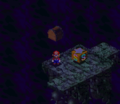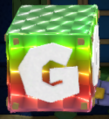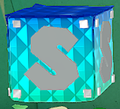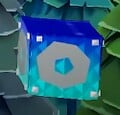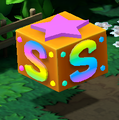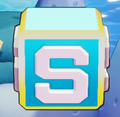Save Block
| Save Block | |
|---|---|
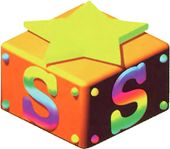 Artwork of a Save Block from Super Mario RPG: Legend of the Seven Stars | |
| First appearance | Super Mario RPG: Legend of the Seven Stars (1996) |
| Latest appearance | Mario & Luigi: Brothership (2024) |
| Effect | Allows the player to save their game progress when activated |
- “You look a bit green, so 'ave a wee bit of advice, on me—hit that Save Block to save. 'Cause the thing about life is, ya never know when you're gonna kick the ol' bucket.”
- —Bob-omb in Rogueport, Paper Mario: The Thousand Year Door (Nintendo Switch)
A Save Block (or save block) is a block in the role-playing games that enables the player to save their game progress. They are often activated when struck.
History[edit]
Super Mario RPG: Legend of the Seven Stars[edit]
Save Blocks first appear in Super Mario RPG: Legend of the Seven Stars and are seen again in its Nintendo Switch remake, being golden-colored blocks with a rainbow "S" label on their sides and a star on top of them. When Mario jumps on one, the block takes him to the save screen, allowing the player to save their game. Additionally, Save Blocks can always be found inside inns. The Save Block's letter S's appear in serif format in the official artwork, but they use the sans-serif format in the Save Block's in-game sprite.
Paper Mario series[edit]
Save Blocks are seen again in the Paper Mario series. This time, instead of jumping on top, they need to be hit from underneath like regular blocks. They also have a vastly different appearance, being rainbow-colored blocks labeled with a white "S" with a star inside rather than the Super Mario Bros.-style blocks with a star on top seen in Super Mario RPG: Legend of the Seven Stars. At the end of Paper Mario, after Mario defeats Bowser, the Save Block near the Toad House and the Post Office in Toad Town will be removed with its position blocked by Bruce the Bob-omb and an unnamed Koopa Troopa. In Paper Mario: Color Splash, the "S" label on them scrolls sideways like how ? Blocks in Super Mario Bros. 3 do. Save Blocks are also commonly found near Recovery Blocks. In Paper Mario: The Origami King, Save Blocks resemble their appearance from Paper Mario: Color Splash, as they are rainbow-colored with a scrolling "S" label.
In the Spanish translations of Paper Mario, Paper Mario: Sticker Star, Paper Mario: Color Splash, Paper Mario: The Origami King and the Nintendo Switch remake of Paper Mario: The Thousand-Year Door, the letter on the Save Blocks is changed to "G" for guardar ("to save"). Likewise, in the Dutch versions of Paper Mario: Color Splash, Paper Mario: The Origami King and the Paper Mario: The Thousand-Year Door remake, the letter of the Save Blocks is changed to "O" for opslaan ("to save").
Mario & Luigi series[edit]
In the first two installments of the Mario & Luigi series, Save Blocks are replaced by Save Albums; however, Save Blocks are present in most of the locations of Mario & Luigi: Bowser's Inside Story, Mario & Luigi: Dream Team, Mario & Luigi: Bowser's Inside Story + Bowser Jr.'s Journey, and Mario & Luigi: Brothership as well as in the form of yellow Emoglobins in Bowser's Inside Story and its remake. In all four games, Mario and Luigi have to hit the blocks from below similar to how it is done in the Paper Mario games, while in Mario & Luigi: Bowser's Inside Story and Mario & Luigi: Bowser's Inside Story + Bowser Jr.'s Journey, Bowser has to hit the blocks by punching them; as such, Save Blocks have their elevation lowered in his presence. In Mario & Luigi: Bowser's Inside Story and Mario & Luigi: Bowser's Inside Story + Bowser Jr.'s Journey, Save Blocks are dark blue blocks that have rainbow-colored linings and "S" labels, though in Mario & Luigi: Dream Team and Mario & Luigi: Brothership, they are blue-colored blocks with golden linings and a white-colored "S" label. Save Blocks and Save Albums are completely absent in Mario & Luigi: Paper Jam; as such, the player must save from the menu.
Locations[edit]
| Paper Mario | |
|---|---|
| Goomba Village | In the back area where Mario lands |
| Outside the Goomba house | |
| Goomba Road | At the midpoint between the village and the Goomba King's Fortress |
| Toad Town | Outside the Toad House and Toad Town Post Office (inaccessible during the epilogue) |
| Outside Club 64 | |
| By the exit leading to Forever Forest | |
| Toad Town Tunnels | In the Area east of the entrance |
| Koopa Village | In front of the house with a blue roof |
| Koopa Bros. Fortress | Outside the front entrance |
| Outside the rear entrance | |
| Outside of Bowser???'s chamber | |
| Mt. Rugged | At the train station |
| Near the waterfalls | |
| Dry Dry Desert | At the entrance to the desert |
| Dry Dry Outpost | In front of the shop |
| Dry Dry Ruins | Inside the entrance |
| In the antechamber leading to Tutankoopa's chamber | |
| Boo's Mansion | Outside the entrance |
| Gusty Gulch | In the area to the right of Windy Mill |
| Tubba Blubba's Castle | Outside the entrance |
| In the antechamber leading to Tubba Blubba's room | |
| Shy Guy's Toy Box | At each of the four colored train stations |
| Yoshi's Village | Outside Yoshi's Cabana |
| Mt. Lavalava | Inside the main cavern |
| In the cavern leading to Lava Piranha's chamber | |
| Flower Fields | In front of the Wise Wisterwood |
| Shiver City | Between the Toad House and Shiver Shop |
| Starborn Valley | Outside the Toad House |
| Shiver Mountain | At the base of the mountain |
| Crystal Palace | In the room below the entrance hall |
| In the antechamber leading to the Crystal King | |
| Star Haven | Near the Toad House |
| Bowser's Castle | In the garage |
| Exterior, near a prison cell | |
| In each of the first and second central chambers | |
| In the second central chambers | |
| Peach's Castle | Outside the entrance |
| At the base of the central tower | |
| Paper Mario: The Thousand-Year Door | |
|---|---|
| Rogueport | At Rogueport Harbor |
| Outside the inn in Rogueport Plaza | |
| At Rogueport Station | |
| Rogueport Sewers | In the eastern entrance room |
| In the western entrance room | |
| In the Thousand-Year Door room (moved to the Pit of 100 Trials entrance room in the Nintendo Switch version) | |
| Petal Meadows | Next to the Warp Pipe |
| Petalburg | Near the shop |
| Shhwonk Fortress | Inside the entrance |
| Hooktail Castle | Inside the entrance |
| At the bottom of the grand stairwell, near the door to the prison | |
| Outside Hooktail's chamber | |
| Boggly Woods | Near the Warp Pipe in the first area (moved to the second section of the woods in the Nintendo Switch version) |
| Inside Flurrie's House | |
| The Great Tree | Inside the entrance |
| Lower level of the Pider room, near the shop entrance | |
| Outside the lowest chamber | |
| Glitzville | Outside the Glitz Pit |
| Glitz Pit | Red team side of the backstage corridor |
| In front of the champion's room | |
| Twilight Town | Outside the inn |
| Twilight Trail | To the right of the fallen tree (Nintendo Switch version only) |
| Creepy Steeple | Outside the entrance |
| Upper level of the main hall (moved to spiral stairway room in Nintendo Switch version) | |
| In the underground connecting chamber beneath the well and the steeple. | |
| Keelhaul Key | Outside the shantytown inn |
| Pirate's Grotto | Inside the entrance |
| In the cavern to the right of the sluice gate controls | |
| Outside the shipwreck containing the Black chest (Nintendo Switch version only) | |
| In front of the Black Skull (disappears after Chapter 5 is completed) | |
| Excess Express | To the left of room 005 |
| Inside the engineer's car | |
| Riverside Station | Outside the entrance |
| Poshley Heights | In front of the train station |
| Fahr Outpost | Outside the inn |
| Moon | Near Mario's landing site |
| X-Naut Fortress | Inside the entrance |
| East of the elevator on Sublevel 2 (Nintendo Switch version only) | |
| Lower level of the X-Naut factory | |
| Palace of Shadow | On the large bridge over a lake |
| Outside the Palace of Shadow Tower | |
| Outside Gloomtail's chamber | |
| In the middle of the deep underground section | |
| In the ante-chamber leading to the throne room | |
| At the bottom of the stairwell leading to the crypt | |
Gallery[edit]
Sprites[edit]
Screenshots[edit]
Save Block has an upside-down texture clearly visible in Glitz Pit. This is present with all save blocks, but is usually hidden.
Paper Mario: The Thousand-Year Door (Nintendo Switch)
Names in other languages[edit]
| Language | Name | Meaning | Notes |
|---|---|---|---|
| Japanese | セーブブロック[?] Sēbu Burokku |
Save Block | |
| Chinese (simplified) | 保存砖块[3] Bǎocún Zhuānkuài |
Save Block | |
| Chinese (traditional) | 儲存磚塊[?] Chúcún Zhuānkuài |
Storage Block | |
| Dutch | opslagblok[?] | save-block | |
| French | Bloc sauvegarde[?] | Save block | |
| French (NOA) | Bloc de sauvegarde[?] | Save block | Super Mario RPG |
| French (NOE) | bloc de sauvegarde[?] | save block | Super Mario RPG |
| German | Speicher-Block[?] | Storage Block | |
| Speicherblöcke[?] | Storage-block | Super Mario RPG | |
| Italian | Blocco di salvataggio[1][2] | Block of saving | Super Mario RPG: Legend of the Seven Stars and Super Mario RPG |
| Blocco Salvataggio[?] | Save Block | Paper Mario: The Thousand Year Door, Mario & Luigi: Bowser Inside Story | |
| Blocco salvataggio[?] | Save block | recent games | |
| Korean | 저장블록[?] Jeojang Beullok |
Save Block | |
| Portuguese | Bloco de gravação[?] | Saving Block | |
| Spanish | bloque de guardado[?] | save Block |
Trivia[edit]
- In Paper Mario, after Mario defeats Bowser, the Save Block near the Toad Town Post Office disappears, making it impossible for the player to save the game in its "completed" state.
References[edit]
- ^ Super Mario RPG: Legend of the Seven Stars, Italian e-manual. Page 13.
- ^ Super Mario RPG (Nintendo Switch), Italian in-game help section, saves
- ^ iQue (2004). 纸片马力欧 (Zhǐpiàn Mǎlì'ōu) instruction booklet. iQue (Simplified Chinese). Page 9.
- Blocks
- Mario & Luigi: Bowser's Inside Story objects
- Mario & Luigi: Brothership objects
- Mario & Luigi: Dream Team objects
- Mario & Luigi: Paper Jam objects
- Paper Mario objects
- Paper Mario: Color Splash objects
- Paper Mario: The Origami King objects
- Paper Mario: The Thousand-Year Door objects
- Paper Mario: Sticker Star objects
- Super Mario RPG: Legend of the Seven Stars objects
- Super Paper Mario objects











